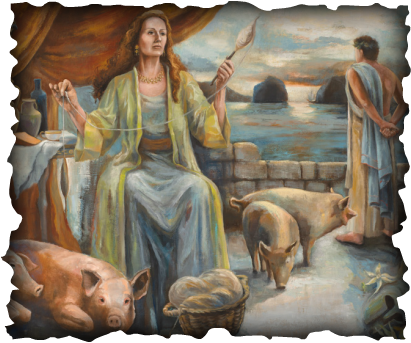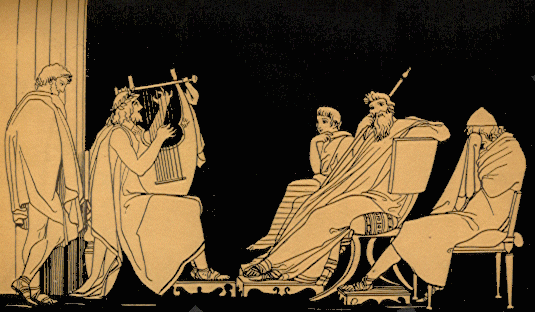The story begins with Odysseus and his men raiding the Cicones. Their narrow escape led them to the Land of the Lotus Eaters. In some respect this Land of the Lotus Eaters reminds me of casinos. When in the right mindset a casino can suck away many hours making it only feel like minutes. The bulk of book nine refers to Odysseus' encounter with Polyphemus the Cyclops and also the son of Poseidon. True, Odysseus was able to save some of his men from the wrath of Polyphemus, but if it were not for Odysseus' arrogance they would have not been in that situation. His crew wanted to plunder the cave and move on, but Odysseus had to meet the owner and receive his expected gift. It is only after the men are captured in the cave that Odysseus understands his stupidity. Through clever planning Odysseus frees his men by blinding the Cyclops and riding out of the cave under his sheep.
Before this took place he told Polyphemus that his name was "Nobody" in order to confuse the neighbors who came to help. The pride of Odysseus is shown when he yells back his true name to the Cyclops. When learning of this name Polyphemus remembers Telemus' prophecy and can not believe a small man was able to outwit his strength. This demonstration of aggression proved to be fatal for Odysseus and his men. Odysseus is built up as a hero, but in turn through this boost of self-actualization he becomes arrogant and believes that he is entitled to everything his heart desires.
 |
| http://tomtomrant.wordpress.com/ 2013/04/10/two-species-of-monster/ |
Book ten focuses on three different lands. Odysseus and his crew reached the Aeolian island and were well received. King Aeolus gives Odysseus a bag of wind to help them on their journey to Ithaca. As seen in book nine the crew become envious of Odysseus' gifts and open the bag of wind thinking it to be riches. By letting out the wind their ships was thrown off course. To make matters worse the ships were in sight of Ithaca when this occurred. Oddly enough they land on the Aeolian island again but this time are run off after begin viewed as a bad omen. Odysseus and his crew then land on the region of Laistrygones. It is only after the crew meets the beautiful princes of the land and go to talk with the King that they learn these people are cannibals. Sadly, Odysseus' ship is the only ship to escape amongst the fleet. With grief in their souls the crew lands on the Aeaean island, home of Circe.
 |
| http://odyssey60.weebly.com/ cicones-and-circe.html |
This nymph seduces many of the crew to drink her poisoned wine and are turned into swine. It is only through the help of Hermes that Odysseus is able to out wit Circe and gain her pleasure. Hermes is helpful to Odysseus through the use of prophesy. This type of prophesy was seen during his encounter with the Cyclops. Homer uses prophecy to show the importance and wisdom of Odysseus. He never reveals his name until after he learns the motives of his captors. Circe is crafty enough to hold the men on the island for a year through her enticing life of ease for "battle-hardened spirits" (514). Odysseus finally pleads with Circe to let them turn for Ithaca. She grants him this wish but advises him to "consult the ghost of Tiresias" (541). The book ends with the crew grieving because of their next journey down into the House of Death.
Odysseus and his crew make it to the House of Death in book eleven by following Circe's wisdom. They meet Teiresias, who predicts "the future" of Odysseus that we, as readers, know to be true. Teiresias also warns Odysseus about Helios and the Island of the Sun. He informs Odysseus that if Helios herds are killed his revenge will be death. By turning the timeline around Homer is able to use foreshadowing to help the reader understand the significance of different scenes. Odysseus then talks to his mother and she updates him on the what is happening in his humble home. She assures him that his beloved Penelope is faithful and that his son is seeing to the needs of the estate. Many ghost come and speak with Odysseus each with differing stories. Odysseus comes back to the present time and becomes quiet Queen Arete ends the silence by rallying the people into blessing him with many gifts. Not to be out done King Alcinous agrees and feels that he must give the most but pushes Odysseus to continue his tale. King Alcinous wants to know if Odysseus met any famous warriors while at the House of Death. Odysseus delves into his meeting with Agamemnon who warns him about his return home from personal experience. Achilles is also met by Odysseus and wants to know how his son, Neoptolemus, did in the war. After relaying how brave his son was, Odysseus continues to see well-known figures. After some time Odysseus is mobbed by souls who want to know about their loved ones on earth. The book ends with Odysseus fleeing from the House of Death in order to free himself from these sad souls.
The men stop and see Circe at the beginning of book twelve. While there she tells Odysseus of the trials ahead. She warns him about the Sirens and Scylla/Charybdis. She also reiterates how important it is that Odysseus and his men leave Helios' herds at peace. To begin there journey Odysseus tells the men of the Sirens and how to make it through their trap.
Scylla takes her victims when the crew journeys through the crags. Eurylochus rallies the men to stop at the Island of the Sun, after Odysseus urges them onward. Odysseus final gives in to their pleas but only after make the crew swear an oath not to slaughter any of Helios' herds. In the beginning of their stay of the island the men stay true to their word. Once their food supply runs out and they are forced to hunt for food, Eurylochus rallies the men, once again, to kill some of the cattle. During this episode Odysseus is away praying/sleeping. Odysseus returns to the smell of meat cooking and because distraught. His men see no harm and continue to eat their plunder for six more days. The winds finally change and Odysseus and his men set out again for Ithaca. Once out at sea Zeus creates a storm that plunges the crew to the depths of the water. As prophesied Odysseus survives but is pushed back to Charybdis and escapes for a second time. He eventually reaches Ogygia, Calypso island, and breaks off from his story. Odysseus ends the book by stating that he sees no reason to retell what the King and Queen already have heard.
 |
| http://mst3kriffaday.wordpress.com/2013/05/23/ 143-scylla-and-charybdis-actual-footage/ |



